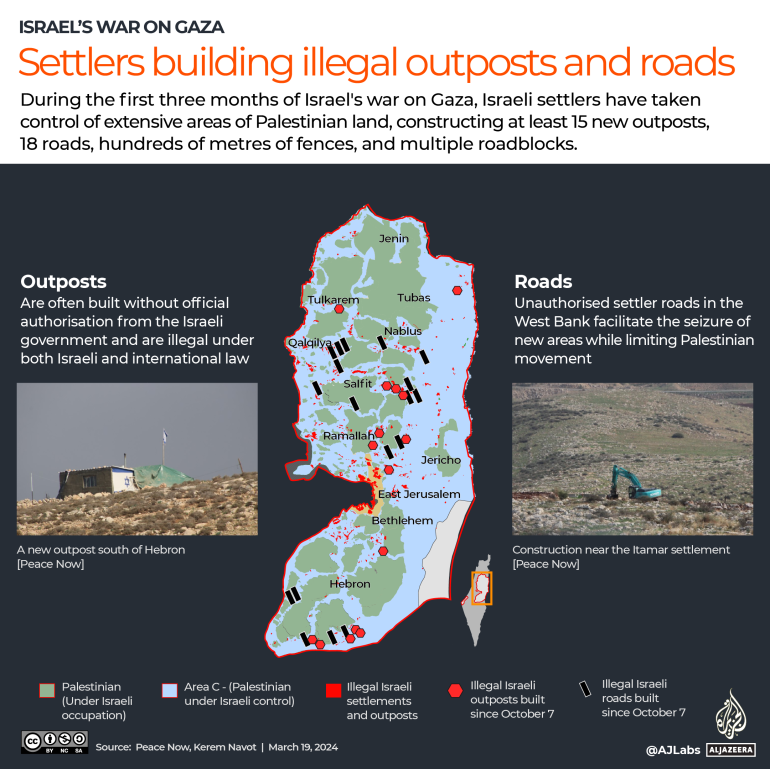How Israeli settlers are expanding illegal outposts amid Gaza war
In the secluded hills south of Hebron, in the occupied West Bank, Abu al-Kabash used to wake up daily to his prized possession: a grove of pomegranate and fig trees that towered over the six different kinds of aloe plants enveloping his home.
That is all gone.
Since Israel started its war on Gaza following Hamas's October 7 attacks, assaults on Palestinians by Israeli settlers became so violent that the 76-year-old farmer had to abandon the land passed down to him from his father, grandfather and great-grandfather.
“It was a choice between life or death,” Abu al-Kabash said.
He is far from the only one. More than 1,200 Palestinians across the occupied West Bank have been forced from their homes since the conflict started, according to rights groups and the United Nations.
Data gathered by activists and verified with satellite images by Al Jazeera's verification unit, Sanad, show that between October 2023 and January 2024, settlers in the occupied West Bank have built at least 15 outposts and 18 roads - illegal under both Israeli and international law. In addition, settlers built hundreds of metres of fences and multiple roadblocks, further limiting Palestinians' movement.
The unprecedented uprooting has led to the disintegration of at least 15 Palestinian communities so far, with Israeli settlers fast expanding their presence. Their goal, experts say, is to reshape the demography of the West Bank while breaking the backbone of the territory earmarked for a future Palestinian state.
“When there is a war, that is when settlers take advantage and try to establish as many outposts as they can,” said Mauricio Lapchik, an activist with Peace Now, an Israeli organisation documenting settlement activities. The group recorded a similar uptick in illegal outposts during the years of the second Intifada in the early 2000s.

Illegal outposts
Outposts are typically makeshift encampments ranging from single caravans to a few modular structures built on rural Palestinian land.
They are built by members of Israel's wider settler movement, which seeks to enforce an Israeli presence on illegally occupied land. The outpost builders are often driven by an ultra-hardline ideology that demands Jews populate all of Palestinian land and force Palestinians out.
All outposts, like settlements, are illegal under international law. Israel, however, considers only the outposts illegal, claiming they were erected without government approval. Yet, outposts are often approved retroactively as settlements.
Satellite images show outposts built in the first four months of the war scattered across the occupied West Bank, suggesting Israeli settlers have become bolder and are pushing their presence beyond areas close to existing settlements.
Drag the slider to see before and after images of outpost construction over the past few months.
Illegal roads
Roads are key to establishing a presence in remote areas, and several have been cut through private Palestinian land since October 7.
The dozens of roads not only take Palestinian land but also become lines Palestinian farmers and herders know are dangerous to cross because settlers will attack them.
The verified satellite images below show dozens of new roads built after October 7 linking outposts to other Israeli-controlled areas, such as farms or settlements.